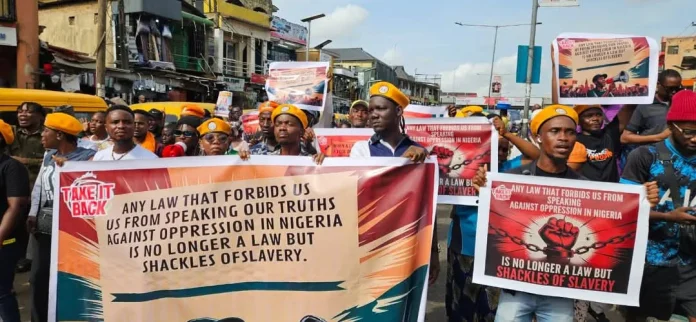Hundreds of Nigerians gathered under the banner of the Take-It-Back Movement on Monday, April 7, 2025, and stormed the streets of Lagos to protest over deepening economic hardship, alleged misuse of the Cybercrime Act, and widening political dysfunction across the country.
The protest, which began at the Ikeja Under Bridge and ended at the front gate of the Lagos State House of Assembly, was a passionate display of public anger, calling for the attention of public office holders.
The demonstrators, made up of young activists and concerned citizens, wielded placards with messages that captured the pain and frustration of a people increasingly pushed to the margins. Some placards read: “When law becomes a tool of oppression, unite to repeal it” and “Any law that forbids us from speaking against oppression is a shackle of slavery.”
While the protest was peaceful and closely monitored by security personnel, the grievances it exposed were anything but calm.
According to Take-It-Back Kosofe Coordinator, “We are here because the Cybercrime Act 2024 is no longer a legal tool, it is now a weapon used to suppress voices that speak truth to power. That law is being used against ordinary Nigerians for merely expressing themselves online. It’s unconstitutional.”
Benjamin while speaking to Bizwatchnigeria.ng also raised concerns over increasing home demolitions in struggling communities like Makoko, Obanikoro, Ikosi, and Odo Eran in Bariga.
“How can the government demolish homes when the people can barely eat? This hardship is artificial, and it must stop,” he said, adding that the Tinubu-led administration has reduced democratic governance to “an oligarchy in disguise.”
At the heart of the protest is a call to repeal the Cybercrime Act 2024, which the movement claims are being weaponised against journalists, social media users, and activists. National Coordinator of the Take-It-Back Movement, Juwon Sanyaolu, explained that the protest is not just about legislation, but about systemic injustice and government negligence.
“If President Tinubu wants to declare a state of emergency, let him do so in sectors that matter like education, housing, healthcare. We have over 18 million out-of-school children and over 30 million people who are homeless or facing demolition. Meanwhile, the President flies abroad for treatment while hospitals at home collapse,” He said.
Protesters also expressed anger at the political stalemate in Rivers State, describing the federal government’s interference as “authoritarian and lawless.” Sanyaolu likened the situation to military rule masked as democracy.
A protester, Abdullahi Okwola, lamented the failure of the Lagos State House of Assembly to engage with the protesters.
“Nobody came out to receive our letter. We heard the Assembly is on suspension over internal crisis. So, who is representing the people?” he asked.
The human cost of these issues was not lost on participants. A middle-aged woman, overwhelmed with emotion, described the devastating impact of poverty on children in her community.
“Small girls, under 10, under 13, are now turning to prostitution. Their mothers can’t afford food or send them to school. People are hungry, yet government officials live in comfort. This is no longer government. It is oppression,” she cried.
As the crowd dispersed without incident, organisers vowed to reconvene, strategise, and intensify pressure until their demands are met.
“We are going back to the streets if we must. The government needs to listen. Nigerians have been patient for too long. The Buhari years were hard enough. Now, this?” Benjamin reiterated.
The Take-It-Back Movement is one of several growing voices challenging Nigeria’s current leadership and calling for a shift toward governance that listens, protects, and empowers the people, starting with economic reform, protection of free speech, and accountability.













